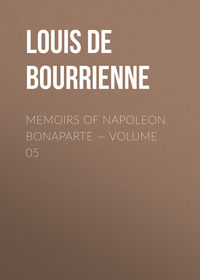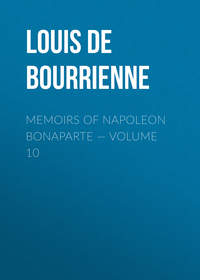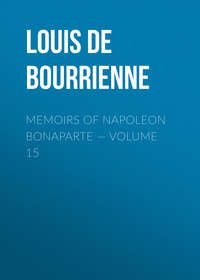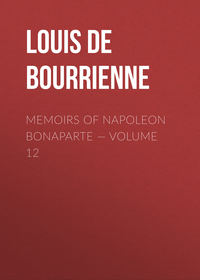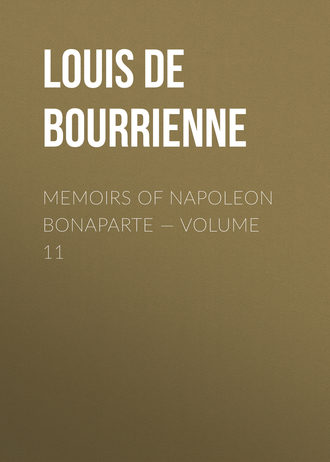 полная версия
полная версияMemoirs of Napoleon Bonaparte — Volume 11
The peace, which was soon concluded at Bucharest, between Russia, and Turkey increased Napoleon's embarrassment. The left of the Russian army, secured by the neutrality of Turkey, was reinforced by Bagration's corps from Moldavia: it subsequently occupied the right of the Beresina, and destroyed the last hope of saving the wreck of the French army. It is difficult to conceive how Turkey could have allowed the consideration of injuries she had received from France to induce her to terminate the war with Russia when France was attacking that power with immense forces. The Turks never had a fairer opportunity for taking revenge on Russia, and, unfortunately for Napoleon, they suffered it to escape.
Napoleon was not more successful when he sought the alliance of a Prince whose fortune he had made, and who was allied to his family, but with whom he had never been on terms of good understanding. The Emperor Alexander had a considerable corps of troops in Finland destined to protect that country against the Sweden, Napoleon having consented to that occupation in order to gain the provisional consent of Alexander to the invasion of Spain. What was the course pursued by Napoleon when, being at war with Russia, he wished to detach Sweden from her alliance with Alexander? He intimated to Bernadotte that he had a sure opportunity of retaking Finland, a conquest which would gratify his subjects and win their attachment to him. By this alliance Napoleon wished to force Alexander not to withdraw the troops who were in the north of his Empire, but rather to augment their numbers in order to cover Finland and St. Petersburg. It was thus that Napoleon endeavoured to draw the Prince Royal into his coalition. It was of little consequence to Napoleon whether Bernadotte succeeded or not. The Emperor Alexander would nevertheless have been obliged to increase his force in Finland; that was all that Napoleon wished. In the gigantic struggle upon which France and Russia were about to enter the most trivial alliance was not to be neglected. In January 1812 Davoust invaded Swedish Pomerania without any declaration of war, and without any apparent motive. Was this inconceivable violation of territory likely to dispose the Prince Royal of Sweden to the proposed alliance, even had that alliance not been adverse to the interests of his country? That was impossible; and Bernadotte took the part which was expected of him. He rejected the offers of Napoleon, and prepared for coming events.
The Emperor Alexander wished to withdraw his force from Finland for the purpose of more effectively opposing the immense army which threatened his States. Unwilling to expose Finland to an attack on the part of Sweden, he had an interview on the 28th of August 1812, at Abo, with the Prince-Royal, to come to an arrangement with him for uniting their interests. I know that the Emperor of Russia pledged himself, whatever might happen, to protect Bernadotte against the fate of the new dynasties, to guarantee the possession of his throne, and promised that he should have Norway as a compensation for Finland. He even went so far as to hint that Bernadotte might supersede Napoleon. Bernadotte adopted all the propositions of Alexander, and from that moment Sweden made common cause against Napoleon. The Prince Royal's conduct has been much blamed, but the question resolved itself into one of mere political interest. Could Bernadotte, a Swede by adoption, prefer the alliance of an ambitious sovereign whose vengeance he had to fear, and who had sanctioned the seizure of Finland to that of a powerful monarch, his formidable neighbour, his protector in Sweden, and where hostility might effectually support the hereditary claims of young Gustavus? Sweden, in joining France, would thereby have declared herself the enemy of England. Where, then, would have been her navy, her trade and even her existence?
CHAPTER XXVII
1812.
Changeableness of Bonaparte's plans and opinions—Articles for the 'Moniteur' dictated by the First Consul—The Protocol of the Congress of Chatillon—Conversations with Davoust at Hamburg— Promise of the Viceroyalty of Poland—Hope and disappointment of the Poles—Influence of illusion on Bonaparte—The French in Moscow— Disasters of the retreat—Mallet's conspiracy—Intelligence of the affair communicated to Napoleon at Smolensko—Circumstances detailed by Rapp—Real motives of Napoleon's return to Paris—Murat, Ney, and Eugene—Power of the Italians to endure cold—Napoleon's exertions to repair his losses—Defection of General York—Convocation of a Privy Council—War resolved on—Wavering of the Pope—Useless negotiations with Vienna—Maria Louisa appointed Regent.
It may now he asked whether Bonaparte, previous to entering upon the last campaign, had resolved on restoring Poland to independence. The fact is that Bonaparte, as Emperor, never entertained any positive wish to reestablish the old Kingdom of Poland, though at a previous period he was strongly inclined to that re-establishment, of which he felt the necessity. He may have said that he would re-establish the Kingdom of Poland, but I beg leave to say that that is no reason for believing that he entertained any such design. He had said, and even sworn, that he would never aggrandise the territory of the Empire! The changeableness of Bonaparte's ideas, plans, and projects renders it difficult to master them; but they may be best understood when it is considered that all Napoleon's plans and conceptions varied with his fortunes. Thus, it is not unlikely that he might at one time have considered the reestablishment of Poland as essential to European policy, and afterwards have regarded it as adverse to the development of his ambition. Who can venture to guess what passed in his mind when dazzled by his glory at Dresden, and whether in one of his dreams he might not have regarded the Empire of the Jagellons as another gem in the Imperial diadem? The truth is that Bonaparte, when General-in-Chief of the army of Egypt and First Consul, had deeply at heart the avenging the dismemberment of Poland, and I have often conversed with him on this most interesting subject, upon which we entirely concurred in opinion. But times and circumstances were changed since we walked together on the terrace of Cairo and mutually deplored the death of young Sulkowski. Had Sulkowski lived Napoleon's favourable intentions with respect to Poland might perhaps have been confirmed. A fact which explains to me the coolness, I may almost say the indifference, of Bonaparte to the resurrection of Poland is that the commencement of the Consulate was the period at which that measure particularly occupied his attention. How often did he converse on the subject with me and other persons who may yet recollect his sentiments! It was the topic on which he most loved to converse, and on which he spoke with feeling and enthusiasm. In the 'Moniteur' of the period here alluded to I could point out more than one article without signature or official character which Napoleon dictated to me, and the insertion of which in that journal, considering the energy of certain expressions, sufficiently proves that they could have emanated from none but Bonaparte. It was usually in the evening that he dictated to me these articles. Then, when the affairs of the day were over, he would launch into the future, and give free scope to his vast projects. Some of these articles were characterised by so little moderation that the First Consul would very often destroy them in the morning, smiling at the violent ebullitions of the preceding night. At other times I took the liberty of not sending them to the 'Moniteur' on the night on which they were dictated, and though he might earnestly wish their insertion I adduced reasons good or bad, to account for the delay. He would then read over the article in question, and approve of my conduct; but he would sometimes add, "It is nevertheless true that with an independent Kingdom of Poland, and 150,000 disposable troops in the east of France, I should always be master of Russia, Prussia, and Austria."—"General," I would reply," I am entirely of your opinion; but wherefore awaken the suspicions of the interested parties. Leave all to time and circumstances."
The reader may have to learn, and not, perhaps, without some surprise, that in the protocol of the sittings of the Congress of Chatillon Napoleon put forward the spoliation of Poland by the three principal powers allied against him as a claim to a more advantageous peace, and to territorial indemnities for France. In policy he was right, but the report of foreign cannon was already loud enough to drown the best of arguments.
After the ill-timed and useless union of the Hanse Towns to France I returned to Hamburg in the spring of 1811 to convey my family to France. I then had some conversation with Davoust. On one occasion I said to him that if his hopes were realised, and my sad predictions respecting the war with Russia overthrown, I hoped to see the restoration of the Kingdom of Poland. Davoust replied that that event was probable, since he had Napoleon's promise of the Viceroyalty of that Kingdom, and as several of his comrades had been promised starosties. Davoust made no secret of this, and it was generally known throughout Hamburg and the north of Germany.
But notwithstanding what Davoust said respecting. Napoleon's intentions I considered that these promises had been conditional rather than positive.
On Napoleon's arrival in Poland the Diet of Warsaw, assured, as there seemed reason to be, of the Emperor's sentiments, declared the Kingdom free and independent. The different treaties of dismemberment were pronounced to be null; and certainly the Diet had a right so to act, for it calculated upon his support. But the address of the Diet to Napoleon, in which these principles were declared, was ill received. His answer was full of doubt and indecision, the motive of which could not be blamed. To secure the alliance of Austria against Russia he had just guaranteed to his father-in-law the integrity of his dominions. Napoleon therefore declared that he could take no part in any movement or resolution which might disturb Austria in the possession of the Polish provinces forming a part of her Empire. To act otherwise, he said, would be to separate himself from his alliance with Austria, and to throw her into the arms of Russia. But with regard to the Polish-Russian provinces, Napoleon declared he would see what he could do, should Providence favour the good cause. These vague and obscure expressions did not define what he intended to do for the Poles in the event of success crowning his vast enterprises. They excited the distrust of the Poles, and had no other result. On this subject, however, an observation occurs which is of some force as an apology for Napoleon. Poland was successively divided between three powers, Russia, Austria, and Prussia, with each of which Napoleon had been at war, but never with all three at once. He had therefore never been able to take advantage of his victories to re-establish Poland without injuring the interests of neutral powers or of his allies. Hence it may be concluded not only that he never had the positive will which would have triumphed over all obstacles, but also that there never was a possibility of realising those dreams and projects of revenge in which he had indulged on the banks of the Nile, as it were to console the departed spirit of Sulkowski.
Bonaparte's character presents many unaccountable incongruities. Although the most positive man that perhaps ever existed, yet there never was one who more readily yielded to the charm of illusion. In many circumstances the wish and the reality were to him one and the same thing. He never indulged in greater illusions than at the beginning of the campaign of Moscow. Even before the approach of the disasters which accompanied the most fatal retreat recorded in history, all sensible persons concurred in the opinion that the Emperor ought to have passed the winter of 1812-13 in Poland, and have resumed his vast enterprises in the spring. But his natural impatience impelled him forward as it were unconsciously, and he seemed to be under the influence of an invisible demon stronger than even his own strong will. This demon was ambition. He who knew so well the value of time, never sufficiently understood its power, and how much is sometimes gained by delay. Yet Caesar's Commentaries, which were his favourite study, ought to have shown him that Caesar did not conquer Gaul in one campaign. Another illusion by which Napoleon was misled during the campaign of Moscow, and perhaps past experience rendered it very excusable, was the belief that the Emperor Alexander would propose peace when he saw him at the head of his army on the Russian territory. The prolonged stay of Bonaparte at Moscow can indeed be accounted for in no other way than by supposing that he expected the Russian Cabinet would change its opinion and consent to treat for peace. However, whatever might have been the reason, after his long and useless stay in Moscow Napoleon left that city with the design of taking up his winter quarters in Poland; but Fate now frowned upon Napoleon, and in that dreadful retreat the elements seemed leagued with the Russians to destroy the most formidable army ever commanded by one chief. To find a catastrophe in history comparable to that of the Beresina we must go back to the destruction of the legions of Varus.
Notwithstanding the general dismay which prevailed in Paris that capital continued tranquil, when by a singular chance, on the very day on which Napoleon evacuated the burning city of Moscow, Mallet attempted his extraordinary enterprise. This General, who had always professed Republican principles, and was a man of bold decided character, after having been imprisoned for some time, obtained the permission of Government to live in Paris in a hospital house situated near the Barriere de Trove. Of Mallet's, conspiracy it is not necessary to say much after the excellent account given of it in the Memoirs of the Due de Rovigo. Mallet's plan was to make it be believed that Bonaparte had been killed at Moscow, and that a new Government was established under the authority of the Senate. But what could Mallet do? Absolutely nothing: and had his Government continued three days he would have experienced a more favourable chance than that which he ought reasonably to have expected than asserted that the Emperor was dead, but an estafette from Russia would reveal the truth, resuscitate Napoleon, and overwhelm with confusion Mallet and his proclamation. His enterprise was that of a madman. The French were too weary of troubles to throw themselves into the arms of, Mallet or his associate Lahorie, who had figured so disgracefully on the trial of Moreau., Yet, in spite of the evident impossibility of success, it must be confessed that considerable ingenuity and address marked the commencement of the conspiracy. On the 22d of October Mallet escaped from the hospital house and went to Colonel Soulier, who commanded the tenth cohort of the National Guard, whose barracks were situated exactly behind the hospital house. Mallet was loaded with a parcel of forged orders which he had himself prepared. He introduced himself to Soulier under the name of General La Motte, and said that he came from General Mallet.
Colonel Soulier on hearing of the Emperor's death was affected to tears. He immediately ordered the adjutant to assemble the cohort and obey the orders of General La Motte, to whom he expressed his regret for being himself too ill to leave his bed. It was then two o'clock in the morning, and the forged documents respecting the Emperor's death slid the new form of Government were read to the troops by lamplight. Mallet then hastily set off with 1200 men to La Force, and liberated the Sieurs Gudal and Laholze, who were confined there. Mallet informed them of the Emperor's death and of the change of Government; gave them some orders, in obedience to which the Minister and Prefect of Police were arrested in their hotel.
I was then at Courbevoie, and I went to Paris on that very morning to breakfast, as I frequently did, with the Minister of Police. My surprise may be imagined when
—[General Mallet gave out that the Emperor was killed under the walls of Moscow on the 8th of October; be could not take any other day without incurring the risk of being contradicted by the arrival of the regular courier. The Emperor being dead, he concluded that the Senate ought to be invested with the supreme authority, and he therefore resolved to address himself in the name of that body to the nation and the army. In a proclamation to the soldiers he deplored the death of the Emperor; in another, after announcing the abolition of the Imperial system and the Restoration of the Republic, he indicated the manner in which the Government was to be reconstructed, described the branches into which public authority was to be divided, and named the Directors. Attached to the different documents there appeared the signatures of several Senators whose names he recollected but with whom he had ceased to have any intercourse for a great number of years. . These signatures were all written by Mallet, and he drew up a decree in the name of the Senate, and signed by the same Senators, appointing himself Governor of Paris, and commander of the troops of the first military division. He also drew up other decrees in the same form which purported to promote to higher ranks all the military officers he intended to make instruments in the execution of his enterprise.
He ordered one regiment to close all the barriers of Paris, and allow no person to pass through them. This was done: so that in all the neighbouring towns from which assistance, in case of need, might have been obtained, nothing was known of the transactions in Paris. He sent the other regiments to occupy the Bank, the Treasury, and different Ministerial offices. At the Treasury some resistance was made. The minister of that Department was on the spot, and he employed the guard of his household in maintaining his authority. But in the whole of the two regiments of the Qnard not a single, objection was started to the execution of Mallet's orders (Memoirs of the Duc de Rivogo, tome vi. p. 20.)]—
I learned from the porter that the Due de Rovigo had been arrested and carried to the prison of La Force. I went into the house and was informed, to my great astonishment, that the ephemeral Minister was being measured for his official suit, an act which so completely denoted the character of the conspirator that it gave me an insight into the business.
Mallet repaired to General Hulin, who had the command of Paris. He informed him that he had been directed by the Minister of Police to arrest him and seal his papers. Hulin asked to see the order, and then entered his cabinet, where Mallet followed him, and just as Hulin was turning round to speak to him he fired a pistol in his face. Hulin fell: the ball entered his cheek, but the wound was not mortal. The most singular circumstance connected with the whole affair is, that the captain whom Mallet had directed to follow him, and who accompanied him to Hulin's, saw nothing extraordinary in all this, and did nothing to stop it. Mallet next proceeded, very composedly, to Adjutant-General Doucet's. It happened that one of the inspectors of the police was there. He recognised General Mallet as being a man under his supervision. He told him that he had no right to quit the hospital house without leave, and ordered him to be arrested. Mallet, seeing that all was over, was in the act of drawing a pistol from his pocket, but being observed was seized and disarmed. Thus terminated this extraordinary conspiracy, for which fourteen lives paid the forfeit; but, with the exception of Mallet, Guidal, and Lahorie, all the others concerned in it were either machines or dupes.
This affair produced but little effect in Paris, for the enterprise and its result were make known simultaneously. But it was thought droll enough that the Minister and Prefect of Police should be imprisoned by the men who only the day before were their prisoners. Next day I went to see Savary, who had not yet recovered from the stupefaction caused by his extraordinary adventure. He was aware that his imprisonment; though it lasted only half an hour, was a subject of merriment to the Parisians. The Emperor, as I have already mentioned, left Moscow on the day when Mallet made his bold attempt, that is to say, the 19th of October. He was at Smolensko when he heard the news. Rapp, who had been wounded before the entrance into Moscow, but who was sufficiently recovered to return home, was with Napoleon when the latter received the despatches containing an account of what had happened in Paris. He informed me that Napoleon was much agitated on perusing them, and that he launched into abuse of the inefficiency of the police. Rapp added that he did not confine himself to complaints against the agents of his authority. "Is, then, my power so insecure," said he, "that it may be put in peril by a single individual, and a prisoner? It would appear that my crown is not fixed very firmly on my head if in my own capital the bold stroke of three adventurers can shake it. Rapp, misfortune never comes alone; this is the complement of what is passing here. I cannot be everywhere; but I must go back to Paris; my presence there is indispensable to reanimate public opinion. I must have men and money. Great successes and great victories will repair all. I must set off." Such were the motives which induced the Emperor to leave his army. It is not without indignation that I have heard his precipitate departure attributed to personal cowardice. He was a stranger to such feelings, and was never more happy than on the field of battle. I can readily conceive that he was much alarmed on hearing of Mallet's enterprise. The remarks which he made to Rapp were those which he knew would be made by the public, and he well knew that the affair was calculated to banish those illusions of power and stability with which he endeavoured to surround his government.
On leaving Moscow Napoleon consigned the wrecks of his army to the care of his most distinguished generals to Murat who had so ably commanded the cavalry, but who abandoned the army to return to Naples; and to Ney, the hero, rather than the Prince of the Moskowa, whose name will be immortal in the annals of glory, as his death will be eternal in the annals of party revenge. Amidst the general disorder Eugene, more than any other chief, maintained a sort of discipline among the Italians; and it was remarked that the troops of the south engaged in the fatal campaign of Moscow had endured the rigour of the cold better than those troops who were natives of less genial climates.
Napoleon's return from Moscow was not like his returns from the campaigns of Vienna and Tilsit when he came back crowned with laurels, and bringing peace as the reward of his triumphs. It was remarked that Napoleon's first great disaster followed the first enterprise he undertook after his marriage with Maria Louisa. This tended to confirm the popular belief that the presence of Josephine was favourable to his fortune; and superstitious as he sometimes was, I will not venture to affirm that he himself did not adopt this ides. He now threw off even the semblance of legality in the measures of his government: he assumed arbitrary power, under the impression that the critical circumstances in which he was placed would excuse everything. But, however inexplicable were the means to which the Emperor resorted to procure resources, it is but just to acknowledge that they were the consequence of his system of government, and that he evinced inconceivable activity in repairing his losses so as to place himself in a situation to resist his enemies, and restore the triumph of the French standard.
But in spite of all Napoleon's endeavours the disasters of the campaign of Russia were daily more and more sensibly felt. The King of Prussia had played a part which was an acknowledgment of his weakness in joining France, instead of openly declaring himself for the cause of Russia, which was also his. Then took place the defection of General York, who commanded the Prussian contingent to Napoleon's army. The King of Prussia, though no doubt secretly satisfied with the conduct of General York, had him tried and condemned; but shortly after that sovereign commanded in person the troops which had turned against ours. The defection of the Prussians produced a very ill effect, and it was easy to perceive that other defections would follow. Napoleon, foreseeing the fatal chances which this event was likely to draw upon him, assembled a privy council, composed of the Ministers and some of the great officers of his household. MM. de Talleyrand and Cambaceres, and the President of the senate were present. Napoleon asked whether, in the complicated difficulties of our situation, it would be more advisable to negotiate for peace or to prepare for a new war. Cambaceres and Talleyrand gave their opinion in favour of peace, which however, Napoleon would not hear of after a defeat; but the Due de Feltre,—[Clarke]—knowing how to touch the susceptible chord in the mind of Bonaparte, said that he would consider the Emperor dishonoured if he consented to the abandonment of the smallest village which had been united to the Empire by a 'Senatus- consulte'. This opinion was adopted, and the war continued.



